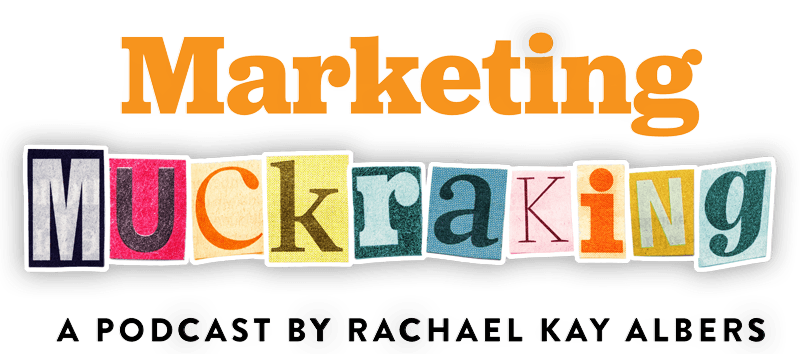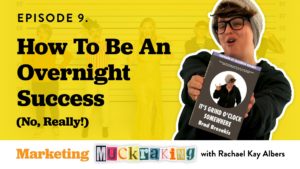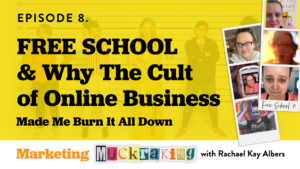Many famous “thought leaders” cite Napoleon Hill’s Think And Grow Rich as the foundation of their philosophy of success.
Donald Trump loves it. So does Shark Tank mogul, Daymond John. And Tiny Tony, or as you may know him, Tony Robbins.
But some names might surprise you.
- Rachel Hollis calls it “incredibly sound” and links to it on her blog.
- Denise Duffield Thomas loves it and writes about its influence on her own work.
- Amanda Frances has a whole tag for it on her blog.
- John Lee Dumas says his book, The Common Path to Uncommon Success, is the “modern day version” of it.
The list goes on — Marie Forleo, Selena Soo, Brendon Burchard, Dean Graziosi, Lewis Howes, Ali Brown, Brooke Castillo, James Wedmore...
If you type a celebrity personal brand name into Google with a plus sign + Think And Grow Rich you’ll find MOST of the folks leading the online business coaching conversation citing this book on their blog, in podcast interviews, or on their recommended book lists.
Never mind the fact that the book and its author’s teachings, Napoleon Hill, have been widely debunked.
Check out Matt Novak’s piece for Gizmodo, “The Untold Story of Napoleon Hill, the Greatest Self-Help Scammer of All Time” for all the dirty details.
Hill lied about his famous connections and his wealth and left a trail of lawsuits, murder investigations, cults, and angry ex-business partners in his wake.
With the information we have today, there is absolutely no question that this man was a liar, a scammer, a grifter, and a cult leader.
But people still reference his book as their business bible.
What does that say about them and their own teachings?
This is Part 2 of my debunking of Think And Grow Rich, focused on the immortal baby cult that Hill was a part of — and what happened after.
For Part 1, check out Episode 13 of the Marketing Muckraking podcast. You’ll laugh and you might even cry. It’s that bad.
But why am I coming so hard for Think And Grow Rich? If people like it, what's the problem?
The tagline on some of the editions of Think And Grow Rich reads:
"For men and women who resent poverty"
Not only did Napoleon Hill pull most of this book out of his butt, his entire philosophy is based on denying the systemic harms of capitalism and telling readers that poverty is a choice.
This is harmful because it reinforces the myth that everyone can become wealthy within this economic system if they only have the right attitude.
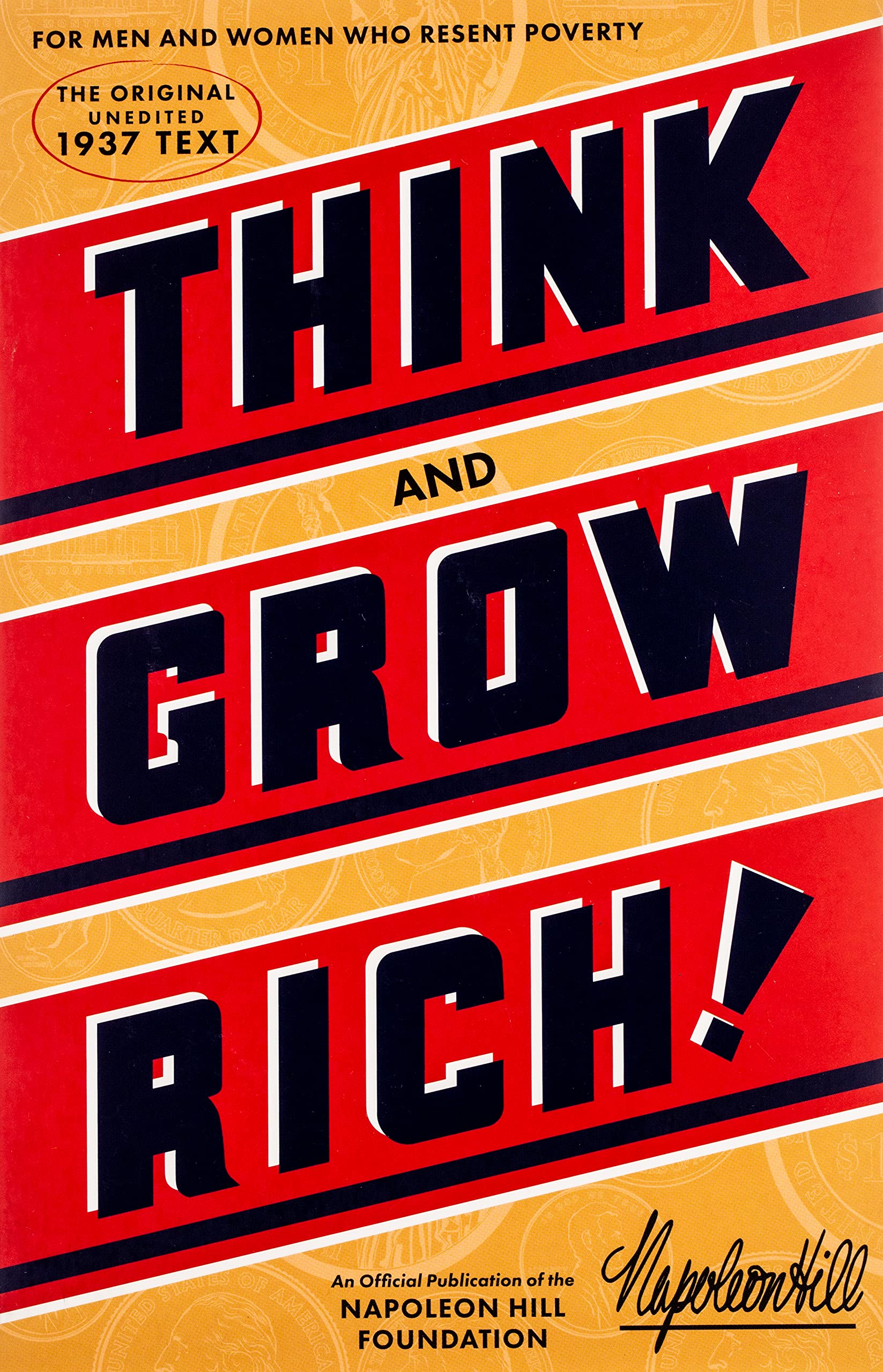
But we know that it's literally impossible for all people, or even most people, to become wealthy within capitalism. The system is based on the very exploitation that Napoleon Hill embodied throughout his life — taking advantage of investors, grifting the masses out of their money, and "faking it" 'til he made it.
I am concerned about the groupthink around books like this, because when a group of wealthy, influential leaders all lift up this message, their clout creates a form of gaslighting for readers who have qualms with its teachings:
"If all these rich, famous, successful people love this book, maybe there's something I'm missing here. Maybe I'm wrong. I'll take another look..."
This same groupthink normalizes the harmful messages in books like The 4 Hour Work Week, where Tim Ferriss encourages readers to take advantage of a "hungry, polite, Excel-proficient Indian army" of underpaid, overseas assistants to build drop shipping empires.
Or Russell Brunson's Expert Secrets, which tell us to follow Hitler's example as a thought leader to create a "cult following" of fans who will do anything you tell them.
Both of these modern business leaders are lauded by the same group of celebrity personal brands who applaud Think And Grow Rich, normalizing the white supremacy, misogyny, and classism in all three texts.
As I say in this episode, at the very least, the leaders who cite these books don't do their research.
And the worst case scenario is, they did their research and didn't care. They believe in these books. They support these teachings. And now they lead millions in parroting these same harmful beliefs.
I made this two-part series because I, too, have been ensnared by the power of groupthink and the self-gaslighting that would have me ignore my own intuition because someone more powerful than me says they believe in something I know to be bogus.
Most of the business "gurus" who herald Think And Grow Rich as "incredibly sound" prey on people who are new to the game and haven't been around long enough to see harmful patterns.
This is how folks like Tony Robbins, Marie Forleo, and Amy Porterfield keep filling their funnels — they target brand new entrepreneurs with 7 figure dreams who don't realize that what they're teaching is available for free on Google or at the local community college.
Just look at Amy Porterfield's upcoming book, Two Weeks Notice, which appeals to folks who still have day jobs and want to jump ship to join the ranks of online entrepreneurs who, from their vantage point in a cubicle, have all magically thought their way to wealth with a few mindset hacks and an online course or two.
The reason that Napoleon Hill got away with a lifetime of scams, going from town to town and continuing to defraud investors and innocent people who "resented poverty" as the tagline on his book says, is because there wasn't an easy-to-find record of his wrongs.
Today, we have the tools to know better. But groupthink still prevails.
No one wants to be the "odd one out" who says, "I know what the cool kids are saying, but I've got a mind to disagree..."
That's why this show exists. Do your own research. Put it on the record.
Think and grow...some agency over who and what you trust.
Mentioned in this episode:
- Part 1 of Think And Grow Rich DEBUNKED on the Marketing Muckraking podcast
- The Untold Story of Napoleon Hill, The Greatest Self-Help Scammer of All Time by Matt Novak for Gizmodo
- Why Are There No Negative B-School Reviews? Episode 6 of Marketing Muckraking
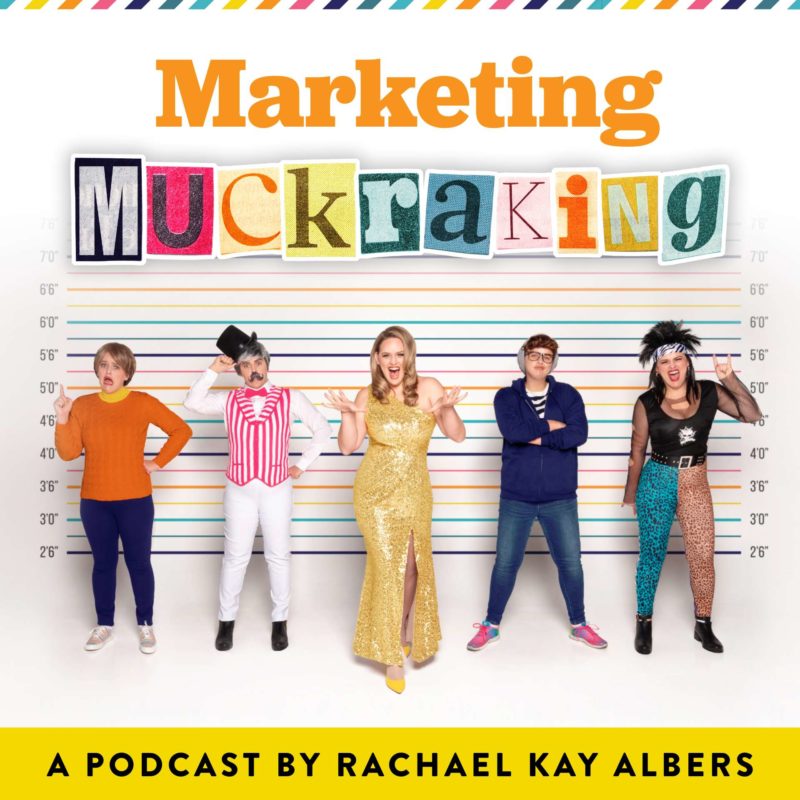
About the Marketing Muckraking podcast
Welcome to Marketing Muckraking, the show that asks not simply what brand culture can do for us, but what it’s doing to us — with your host, creative director, brand strategist gone wild, and the court jester of online business, Rachael Kay Albers — making fun of business and making business fun.
This is the show for rebels, revolutionaries, and renegades who run businesses that burn the rulebook. If you’re sick of business podcasts with all the answers — I’ve got nothing but questions.
Where we swap B School for FREE SCHOOL, easy for honest, and goal digging for marketing in pursuit of meaning.
If you love the show and want to support more marketing muckraking, please subscribe, review, share with your enemies, and if you really want to make my day, you can go to BuyMeARobe.com and leave a little something on the nightstand.

I have no freebie to tempt you with.
No automated email sequence to whisper sweet nothings into your inbox late at night.
Here’s what I do have: a hilarious show on how to market with integrity, sell your services & products successfully, and still not take yourself too seriously. Join me here:
